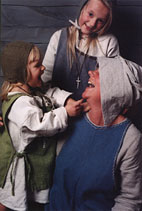Meet the Middle Ages
BackThe Peasants

Most people in Möre, like in the rest of Sweden, were farmers. They led the usual lives of peasants, with sowing, harvesting, milking and slaughter. Near the coast, on the lowlands, there were villages with several farms in them. In the forests, people would live on single farms. In the districts we now know of as the municipalities of Nybro and Emmaboda, as well as the in-lands of the municipality of Torsås, there were no villages at all, only single farms.
During Viking Age, the population of Möre was concentrated to the coastal areas - the in-land was more or less uninhabited. However, during the 12th and 13th century, people began to clear new farm-land in the forests. Place-names with -ryd, -hult and –måla in them, indicate such settlements.
Many of the Möre peasants owned their farms and paid taxes to the crown. They were free-holders - "skattebönder". The gentry owned land and property on the coast and on the borders. The peasants who farmed this land were tenant farmers - "frälsebönder" - they leased the farm from the nobleman and paid taxes to him. The lease would usually be renewed every six years. When the lease was up for renewal, an additional fee was often claimed. It might have been rather more troublesome to have been a tenant farmer then a free-holder. Villages on the coast would have had both tenant farmers and free-holders.
The church, the bishop and the convents were land-owners, too. Their tenant farmers were called church- bishop- or convent-farmers. They paid their lease to the church, the bishop or a convent. The greatest land-owner of Möre was Kalmar Nunnery which owned 60 farms in Möre alone.
In the in-lands of Möre, many farmers leased their land from the Crown - they were crown-farmers. By the end of the 11th century the Crown claimed all land which had not yet been farmed. In this way, all peasants clearing new land became crown-farmers. During the Middle Ages, all peasants in the municipality of Nybro and the remote parts of the municipality of Torsås were crown-farmers – "kronobönder".